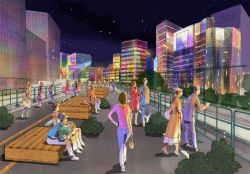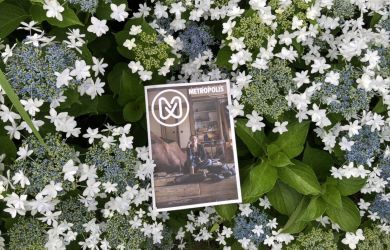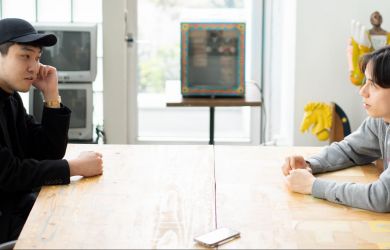
December 2, 2010
Trombone Shorty
Troy Andrews is redefining New Orleans music—with hip-hop beats and power chords
Originally published on metropolis.co.jp on December 2010

Courtesy of Smash
From the loose funk of The Neville Brothers to the ear-singeing trumpet blasts of the Dirty Dozen Brass Band, the music of New Orleans finds its way across the Pacific on a regular basis.
But last summer’s Fuji Rock offered a vision of the city’s music that few in Japan could have imagined. Jumping to rock, hip-hop and electronic rhythms, and going note-for-note with his power chord-playing guitarist, was a young trombonist who’s rapidly establishing himself as the leading player of his generation.
Growing up in New Orleans’ Treme district—the oldest black community in America and the subject of a highly praised HBO TV series—Troy “Trombone Shorty” Andrews was exposed to traditions like the city’s famous “second line” jazz funerals. But, like any kid of the ’90s and ’00s, he also heard plenty of hip-hop and rock ’n’ roll.
“The influences that I have—I didn’t really put them together consciously,” a sleepy Shorty tells Metropolis by phone. It’s 2am in New Orleans, and the trombonist is back home for a few days’ rest in the midst of touring his debut album, Backatown.
“It’s just me putting together the different musical situations in which I’ve played,” he continues, sounding more animated now. “All the styles that you hear—I’ve been in those situations. I’ve played hip-hop, I’ve played rock, blues… And when you do that, you get accustomed to it. It’s like when you move to a different city and learn to speak differently. When you return home, you have a different accent, but you still know where you come from. That’s what it’s like for me when I play with different bands. What I take from them stays with me and then comes out when I compose my own material.”
Shorty got his start at age 4, when he was handed a trombone by a trumpet-playing elder brother who was in need of a sidekick. But his break came when Lenny Kravitz plucked him straight out of high school to join the rocker’s tour. “Getting that experience of playing arenas allowed me to take everything I was taught in New Orleans and go to the major leagues, and learn what Lenny was doing and put it together with what I learned back home,” he says.
However, Shorty’s rock influences didn’t just come from touring with Kravitz. “I listened to a lot of guitar players and was always inspired to reach for something different from what other trombone players were doing,” he explains. “I was always trying to see what would sound cool and different from what we associate with the trombone.”
Shorty’s decidedly contemporary approach may have earned him a few detractors along the way. “There are probably some who think I should play traditional New Orleans jazz music, but I’m 24 and it’s 2010, so I’m influenced by the era I’m part of,” he says. “I’ve learned everything and can play the traditional style, but I try to make it my own, so kids 20 years after me can look back at my music and change it again.”
Some of his peers unacquainted with jazz might also be nonplussed. “I think the younger hip-hop crowds look at it as jazz, which they perceive as a lounge music,” he says. “But when they hear what we’re doing, they feel, ‘OK, we can get into it because the beats are there.’ I think it’s helping the music out, because they might then want to discover other musicians who play horns.”
Shorty’s eclecticism has enabled him to flit from jazz gigs to rock festivals, and endeared him to audiences of remarkable age and ethnic diversity. In the wake of Hurricane Katrina, there is also still a great reserve of goodwill for the musicians of New Orleans around the world.
Before Shorty crashes out for good, our conversation touches inevitably on the disaster, and what has been gained and lost in the five years since the storm slammed the city. “‘Hurricane Season’ is about how every year there are hurricanes, and after Katrina, we play close attention because we don’t want to misjudge again,” he says about the opening track on Backatown. “Whenever there is a hurricane, it puts everybody in a frenzy, thinking about what happened.
“We have lost a tremendous amount of things that can never be replaced, and we’re working to rebuild,” he continues. “But we’ve gained a lot back—we’re definitely gaining the people back, and we’ve gained faith in New Orleans: everybody is helping one another so we can restore the city. We didn’t gain anything physically, but we gained a sense that we need to help each other and not wait around to be rescued.”
Trombone Shorty
Prodigious 24-year-old horn player from New Orleans. Dec 13, 7:30pm, ¥6,000. Club Quattro, Shibuya. Tel: Smash 03-3444-6751.





